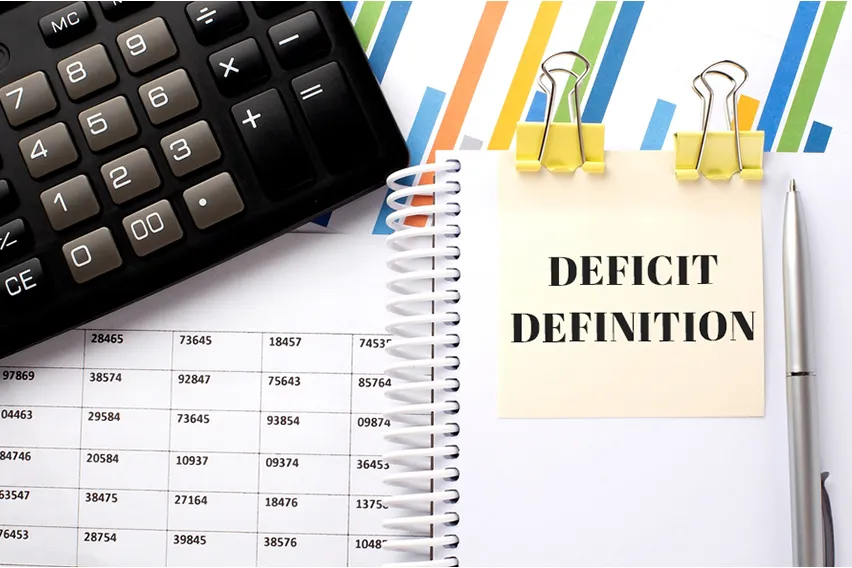What Is Fiscal Deficit? Definition, Components & Importance

When it comes to understanding finances, looking at a country’s financial well being is a good way to forecast the market. A large part of a country’s finances is its fiscal debt. A fiscal debt can be a looming issue when it comes to a country’s spending habits and overall budget. Learn all about fiscal debt, government spending, and public finances in our helpful article!
Here’s What We’ll Cover:
How Is Fiscal Deficit Calculated?
How Does the Government Balance the Deficit?
What Is the Importance of Fiscal Deficit?
What Is Fiscal Deficit?
The definition of fiscal debt is a shortfall in a government’s income compared with its spending. If a government has a fiscal debt, it means that it is spending beyond its means. A fiscal debt typically indicates that economic growth is poor and that fiscal policy may have to be examined. It is an example of a budget deficit.
The opposite of a fiscal deficit is known as fiscal surplus. It’s also referred to as a budget surplus. It is very rare for a country to experience a budget surplus. Most countries aim to reach a balanced budget, or their fiscal deficit target is set low. That way they aren’t spending too much, but they are using their revenue wisely.

How Does a Government Create Income?
Fiscal deficit has a lot to do with both spending and income. A government generates income through tax revenues and federal revenues. While governments do borrow money for their budgets, income excludes any borrowed money.
In most cases, a country doesn’t operate without some form of fiscal deficit. Fiscal deficit is covered by additional borrowing from central banks. This prevents government shutdowns.
It is important to understand that fiscal deficit and fiscal debt are not the same thing. Fiscal deficit only applies to the amount of money that a government lacks for a fiscal year. Fiscal debt is the accumulated amount of debt that results over years of deficit spending.
How Is Fiscal Deficit Calculated?
Calculating the fiscal deficit is rather easy, mathematically. It is calculated by subtracting the total revenue obtained by the government from its total expenditures. Both the revenue and the expenses have to occur during the same time period. This is normally referred to as the fiscal year. The formula looks like the below:
Fiscal Deficit = Government Spending – Total Revenue (excluding borrowing)
There are many different components that fit into both the spending and revenue categories.
Components of Government Spending
Some of the components of government spending are listed below:
- National insurance
- Public spending (unemployment benefits, public assets, etc.)
- National defence
- Debt interest payments
- Other spending
All of these components tend to outweigh the amount made through revenue. As such, most governments tend to have a national deficit.
Components of Government Revenue
Governments generate revenue using the following methods:
- Tax revenues
- Custom duties
- Corporation taxes
As governments only tend to make money from taxes, it can be difficult to increase revenue substantially. Therefore, it’s hard to sustain a surplus of any kind for long.
How Does the Government Balance the Deficit?
The most common way of balancing the deficit for a government is by issuing bonds. The bonds are then sold through central banks on behalf of the government. They are sold to investors who are looking to make a return on their investment. Government bonds are considered to be safe forms of investment.
Other Methods of Raising Revenue
Governments can also raise revenue in other ways. However, they are not likely to do so because of negative criticism. Governments have the ability to increase taxes. This is also known as hiking the tax rate. However, tax increases aren’t generally well-received, and most governments would rather borrow or sell bonds.

What Is the Importance of Fiscal Deficit?
A fiscal deficit can be the reason behind inflation in the economy. As such, it’s important to pay attention to the fiscal deficit. When the deficit increases, so does inflation. When inflation rises, so do the costs of items and interest rates.
The increase of inflation and prices also depends on the reason that expenditures have occurred. If a government spends wisely, then inflation will not rise as rapidly. This is true, even if the deficit rises as well.
Key Takeaways
Most countries in the world experience a fiscal deficit. It’s a sign that they’re spending their revenue and putting money back into the country. However, if the deficit becomes too high, then inflation may occur. This would raise prices and interest rates for everyone. Having a fiscal deficit is expected, but the government will do its best to keep the budget balanced.
If you’re looking for more finance and commerce articles, be sure to check out our resource hub! There are more articles like this one housed there.
RELATED ARTICLES

 Sole Trader Advantages & Disadvantages
Sole Trader Advantages & Disadvantages Standing Order Advantages and Disadvantages
Standing Order Advantages and Disadvantages What Are Economies of Scale? Definition, Types & Example
What Are Economies of Scale? Definition, Types & Example National Living Wage Vs Minimum Wage: What’s the Difference?
National Living Wage Vs Minimum Wage: What’s the Difference? What Is SKU Number? Everything You Need to Know
What Is SKU Number? Everything You Need to Know Budget Deficit Definition: Causes & Effects
Budget Deficit Definition: Causes & Effects